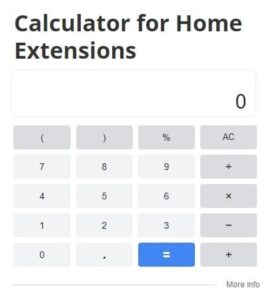
Buying your first home can be an exciting yet daunting experience. The Australian property market is complex, with various factors influencing prices and availability across different regions.
At Home Owners Association, we understand the challenges faced by first-time buyers and want to help you navigate this important milestone with confidence. Our comprehensive guide offers valuable tips for first-time home buyers, covering everything from understanding market trends to navigating legal considerations.
What’s Happening in the Australian Property Market?
The Australian property market continues to evolve in response to various economic and social factors. Recent years have brought significant shifts that reshape how first-time buyers approach their home purchase.
Price Trends Across Major Cities
In 2025, property prices in major metropolitan areas show signs of stabilization. Sydney and Melbourne, traditionally the most expensive markets, have experienced changes. Sydney’s median house price decreased by 2.5% over the past year, while Melbourne saw a modest 1.8% increase (according to CoreLogic data).
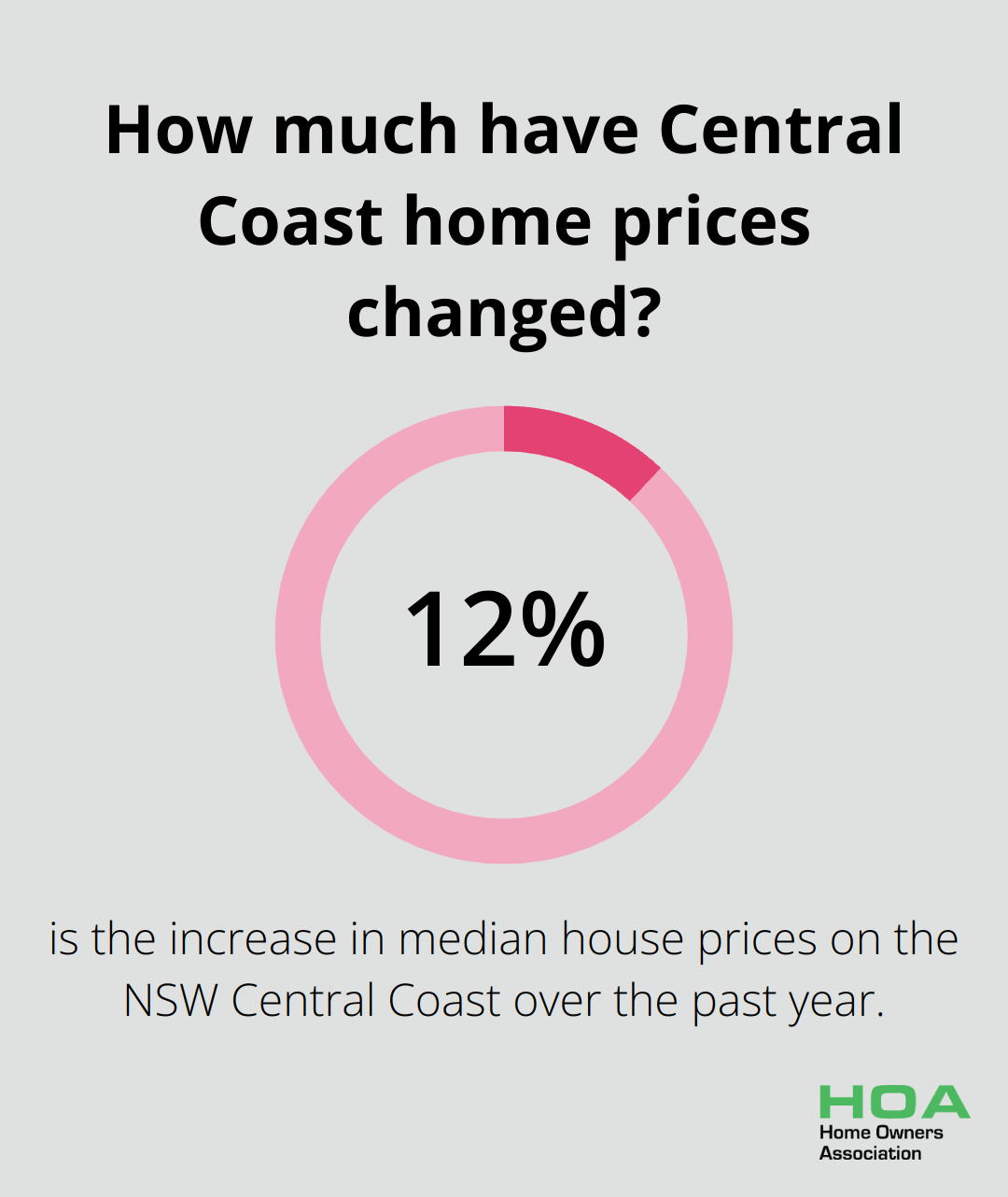
Brisbane and Perth emerge as hotspots for first-time buyers. Brisbane’s property market demonstrated resilience with a 4.2% growth in median house prices, while Perth experienced a substantial 7.5% increase. These figures highlight the importance of exploring beyond major capitals when searching for your first home.
Regional Markets on the Rise
The COVID-19 pandemic accelerated a trend towards regional living, which continues to influence the property market in 2025. Regional areas within a few hours’ drive of capital cities see unprecedented demand. For instance, the NSW Central Coast experienced a 12% increase in median house prices over the past year.
This trend presents an opportunity for first-time buyers to enter the market at a lower price point while maintaining proximity to major urban centers. However, it’s important to consider factors such as job opportunities and infrastructure development when evaluating regional properties.
Economic Factors Shaping the Market
Interest rates play a pivotal role in the property market. The Reserve Bank of Australia’s recent decision to maintain the cash rate at 3.5% provided some stability for potential buyers. However, it’s essential to factor in potential rate increases when budgeting for your first home.
The unemployment rate (currently at 4.8%) is another significant economic factor. A stable job market contributes to consumer confidence and the ability to secure home loans. However, wage growth remains sluggish at 2.1%, which can impact affordability for first-time buyers.
The First Home Guarantee (formerly known as the First Home Loan Deposit Scheme) continues to support eligible first-time buyers. Eligibility criteria include being an Australian citizen or permanent resident and applying as an individual or two joint applicants.
Local Market Conditions
While national trends provide a broad picture, local market conditions can vary greatly. It’s wise to conduct thorough research on your specific area of interest before making a purchase decision. Factors such as local employment opportunities, infrastructure projects, and population growth can significantly impact property values and future growth potential. Even small population increases can lead to large house price rises due to limited capacity for new home construction in the short term.
As we move forward to explore the essential steps in the home buying process, it’s clear that understanding these market trends and economic factors will help you navigate your first home purchase with confidence.
How to Navigate the Home Buying Process
Establish Your Budget and Secure Financing
The first step in your home buying journey is to establish a realistic budget. The Australian Bureau of Statistics reports on quarterly estimates of new borrower-accepted finance commitments for housing, personal and business loans.
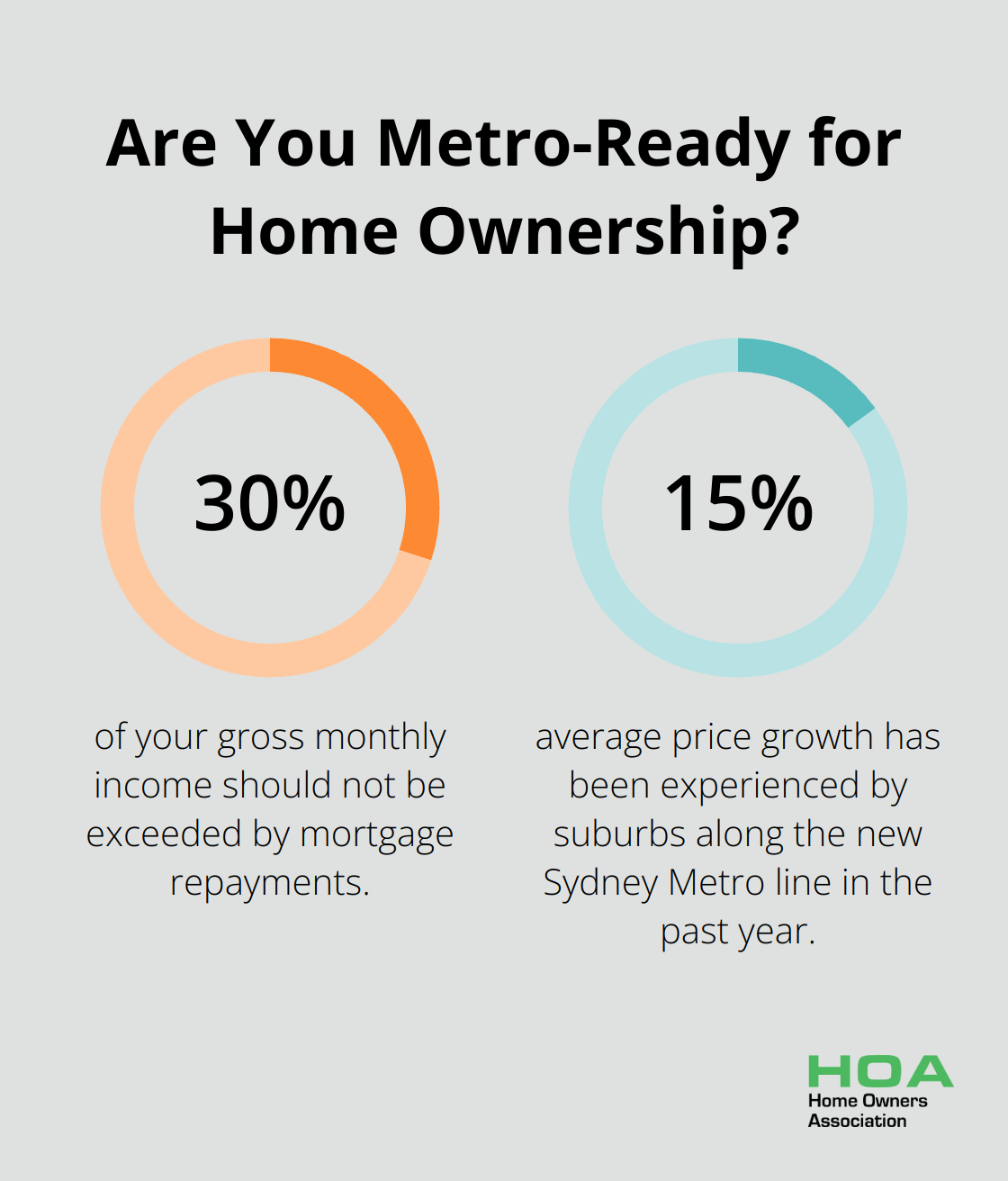
Calculate your income, expenses, and savings to determine your budget. Your mortgage repayments should not exceed 30% of your gross monthly income. Use online mortgage calculators to estimate your borrowing capacity and potential repayments.
Securing financing is essential. Compare mortgage rates and terms from various lenders. Canstar reports on current cash rate predictions from big banks, speculating on future Reserve Bank of Australia (RBA) decisions. Consider obtaining pre-approval for a mortgage to strengthen your position when making offers.
Research Properties and Select Neighborhoods
After you establish your budget, investigate potential neighborhoods and property types. Consider factors like proximity to work, schools, public transport, and amenities.
The Property Council of Australia notes that areas with planned infrastructure improvements often see property value increases. For example, suburbs along the new Sydney Metro line have experienced an average 15% price growth in the past year.
Use online property portals to compare prices and features of homes in your target areas. Attend local council meetings to learn about future development plans that could impact property values.
Work with Real Estate Agents
Real estate agents can be valuable allies in your home search. They have access to off-market properties and can provide insights into local market conditions. Select an agent with experience in your target area and price range.
Prepare a list of questions when you attend open houses. Ask about the property’s history, reasons for sale, and any known issues. Take notes and photos to help you compare properties later.
Make Offers and Negotiate
When you find a property you like, it’s time to make an offer. Research recent sales of similar properties in the area to inform your offer price. The Real Estate Institute of Australia reports that properties in capital cities are selling for an average of 2.5% below the asking price in 2025.
Don’t hesitate to negotiate. If the seller rejects your initial offer, consider making a counter-offer. Be prepared to walk away if the price exceeds your budget or if you’re not comfortable with the terms.
Buying a home is a significant financial decision. Take your time and conduct thorough research. Don’t feel pressured into making hasty decisions. With careful planning and the right support, you can navigate the home buying process effectively.
As you progress through these steps, it’s important to understand the legal considerations and documentation involved in purchasing a property. Let’s explore these aspects in the next section.
Legal Essentials for First-Time Buyers
Understanding Property Contracts
Property contracts form the backbone of your home purchase. These legally binding documents outline the terms of your transaction. In Australia, contracts typically include a cooling-off period, which varies by state. New South Wales offers five business days to cancel without penalty, while Victoria allows three.
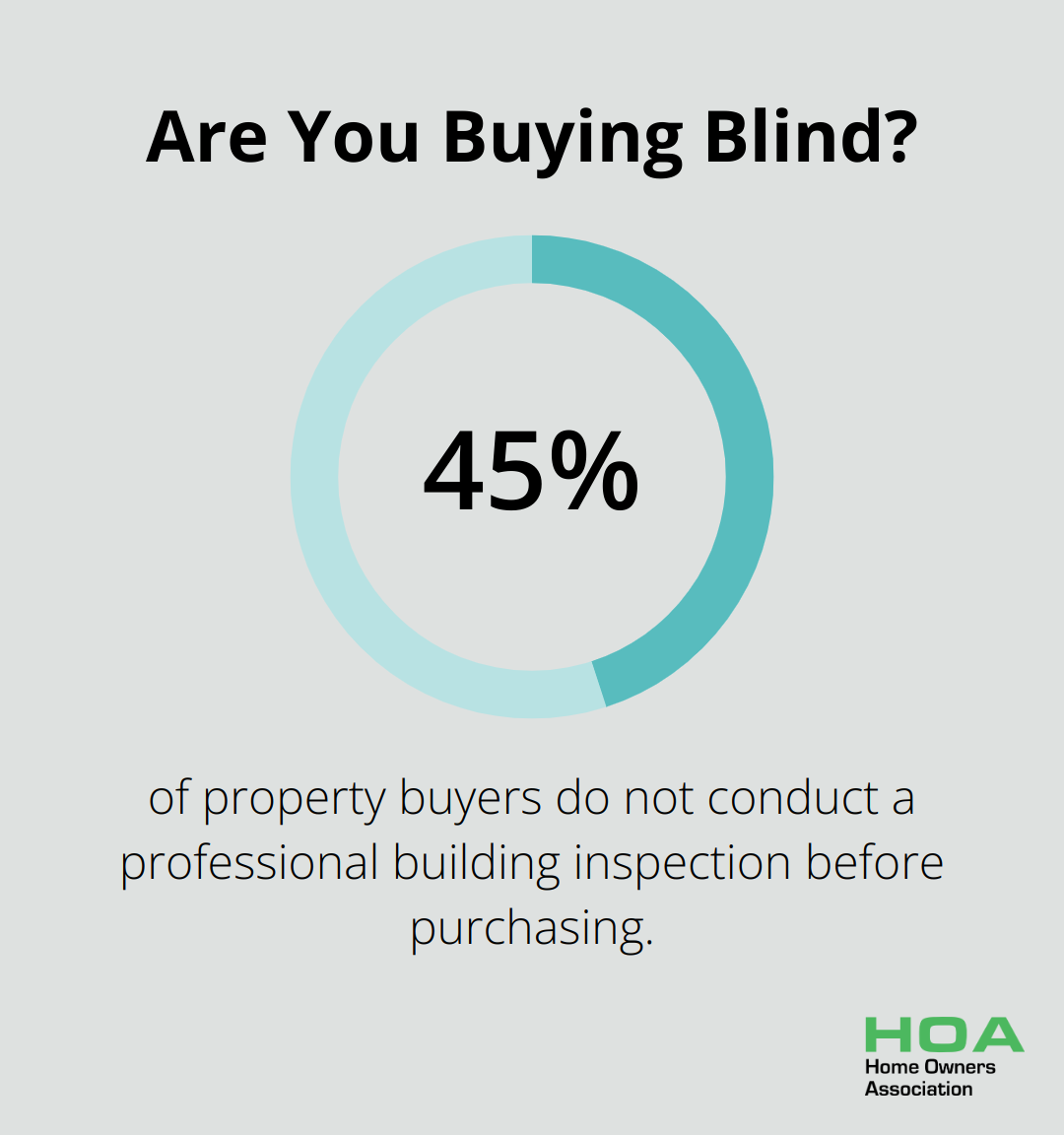
The contract will specify the settlement date (usually 30 to 90 days after signing). This marks when you must pay the balance and officially become the property owner. We advise you to scrutinize all clauses, especially those related to finance and building inspections.
The Importance of Property Inspections
Property inspections should not be overlooked when buying a home. A thorough inspection can uncover hidden issues that could cost you thousands in the future. 30% of buyers in NSW report discovering defects after purchase, and 45% of property buyers do not conduct a professional building inspection before purchasing.
We recommend you hire a licensed building inspector to check for structural issues, pest infestations, and potential safety hazards. In Queensland, termite damage costs homeowners an average of $7,000 per affected property. A comprehensive inspection report will give you leverage in price negotiations or may save you from a costly mistake.
The Settlement Process Explained
The settlement process marks the final stage of your property purchase. It involves transferring ownership from the seller to you and paying the remaining balance. This process typically takes 4-6 weeks after contract signing.
During this period, your conveyancer or solicitor will conduct various checks (including title searches and council zoning certificates). They’ll also coordinate with your lender to ensure funds are available on settlement day.
On the day of settlement, your legal representative will meet with the seller’s representative to exchange documents and funds. Once complete, you’ll receive the keys to your new home. Be prepared for additional costs at this stage, such as stamp duty (which can add up to 5% of the property’s value in some states).
Seeking Professional Legal Advice
We strongly recommend seeking professional legal advice when dealing with property transactions. Conveyancers and solicitors ensure that all legal obligations are met, protect the interests of their clients, and provide peace of mind throughout the process.
Home Owners Association offers guidance and resources to help our members navigate this complex process with confidence. We provide access to a network of trusted legal professionals who specialize in property transactions.
Final Thoughts
Buying your first home can be an exciting and challenging experience. We at Home Owners Association understand the complexities of the Australian property market and offer valuable tips for first-time home buyers. Our expert team provides personalized guidance on budgeting, financing, and navigating legal considerations to help you make informed decisions throughout the process.
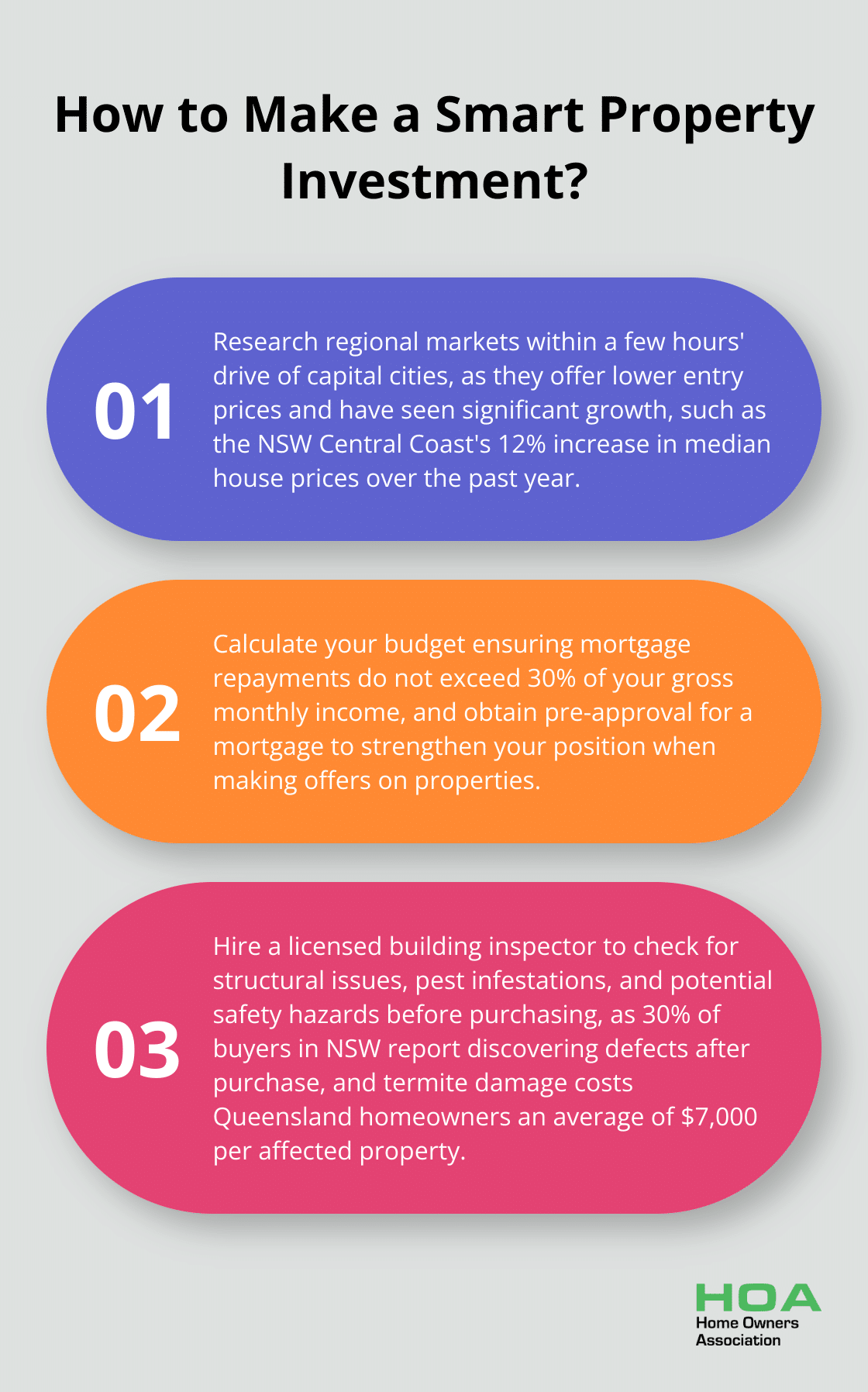
Home Owners Association has empowered homeowners in Melbourne since 1980 with exclusive benefits tailored to the local market. Our members enjoy access to trade pricing and discounts on construction, renovation, and maintenance materials, which can result in significant savings on home projects. We also provide expert advice and educational resources to ensure your home improvement journey is successful.
You will gain access to a network of trusted professionals, including real estate agents, building inspectors, and legal advisors experienced in Melbourne’s unique property landscape. Our commitment extends beyond the initial purchase, as we continue to support you in turning your new house into a home. Join Home Owners Association today and become part of a community dedicated to successful homeownership in Melbourne.





